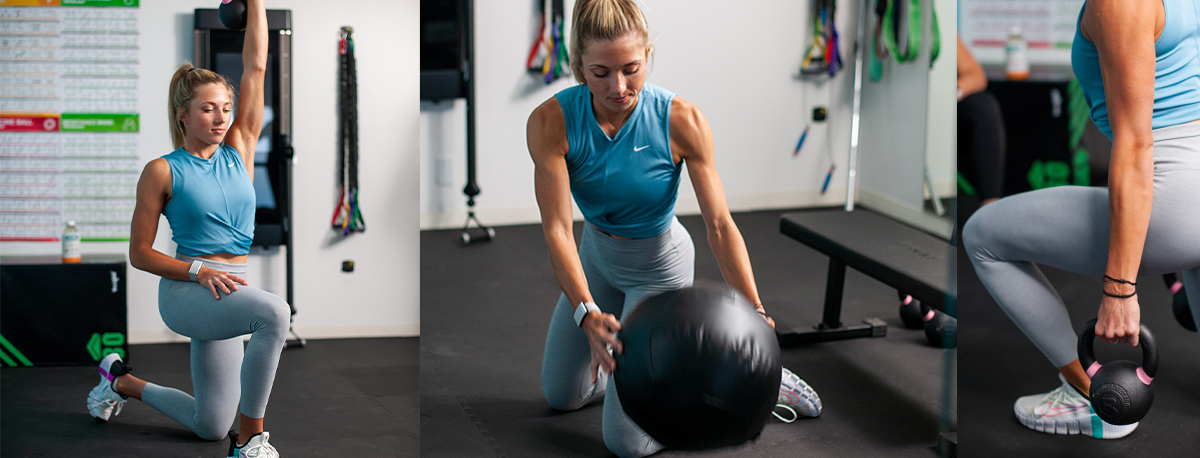Staying consistent year-round with your exercise routine is crucial for seeing results. As the summer months creep up on us, working out might become harder due to the heat. Ensuring you stay adequately hydrated is crucial when you want to workout in the heat. Today we’re discussing the ways to keep your workouts safe and effective despite the sun giving us an added challenge.
While working out in the heat, it is essential to hydrate properly so that you replenish any fluid and electrolytes lost during exercise through sweat. Hydration is a vital component of effective workouts and recovery. If you become dehydrated during exercise, your performance may suffer.
Not only does working out in the heat pose a risk for dehydration, but so does our rising internal temperature. While working out in the heat, an increased metabolic heat production causes a rise in core temperature, which causes us to sweat to limit our body’s rising temp (Lacey et al.) Without proper hydration, hypohydration can occur. This is common at the end of a workout, especially in warmer climates. Replenishing the fluid you lose after training is necessary to restore fluid balance in your body. In addition, prolonged strenuous exercise, especially under hot conditions, may lead to hypomagnesemia or low magnesium levels. When magnesium levels are low, our physical performance can suffer due to decreased muscle function. CF(Rehydrate)® contains the necessary magnesium you need post-workout that can counteract hypomagnesemia by quickly replenishing electrolyte losses
For efficient recovery from any dehydration, CF(Rehydrate)® is the superior choice. The intentional formulation behind CF(Rehydrate)® replenishes lost fluids and essential electrolytes. There are no artificial colors or flavors, and this product has clean ingredients and relies on natural nutrition. CF(Rehydrate)® has an ideal combination of carbohydrates and sodium with less added sugar than traditional sports drinks, giving your body everything it needs and nothing that it doesn’t.
CF(Rehydrate)® contains 45 calories per serving, 10g carbohydrate, less than 1g of sugar, potassium, phosphorus, zinc, magnesium, and selenium. CF(Rehydrate)® provides medical-grade hydration without added sugar, artificial colors, or flavors. Each ingredient has a specific purpose of helping optimize health and support immunity.
Replenishing electrolytes and fluid isn’t the only way to have the most productive workout in the heat. When the weather starts to warm up, it’s essential to ease your training if you aren’t used to working out in the heat. For example, you may not have as strenuous workouts as usual, and it’s vital to listen to your body. If you’re used to running 5 miles in 55-degree weather when the temperature reaches 90, and the sun is beating down on you, you may need to walk some or go a bit slower. Easing back on your workouts when the weather is warm is essential to preventing overheating and even heat stroke.
Another tip is choosing lighter and looser clothing to help you stay cool. Darker colors absorb the heat and may make you heat up faster. It’s also important to always wear sunscreen when working out outside to avoid skin damage. If you dislike the heat, you can aim to wake up early when it’s still cooler and the sun hasn’t come out yet. This way, you get your workout in before it gets too hot. If you are used to working out outside, you can always take your activity inside when the weather heats up.
Staying active during summertime is necessary for optimal health but taking proper precautions is key to keeping your workouts safe. Avoid dehydration and replace fluids and electrolytes lost during exercise with CF(Rehydrate)®. Wear light, loose clothing and always protect your skin with sunscreen. Lastly, try working out before or after the sun is out if you prefer to avoid exercising in the heat. As always, CF Nutrition is here to help you create a lifestyle that makes you feel the best and achieve optimal wellness.
References:
Evans GH, James LJ, Shirreffs SM, Maughan RJ. Optimizing the restoration and maintenance of fluid balance after exercise-induced dehydration. J Appl Physiol (1985). 2017 Apr 1;122(4):945-951. DOI: 10.1152/japplphysiol.00745.2016. Epub 2017 Jan 26. PMID: 28126906.
Lacey J, Corbett J, Forni L, Hooper L, Hughes F, Minto G, Moss C, Price S, Whyte G, Woodcock T, Mythen M, Montgomery H. A multidisciplinary consensus on dehydration: definitions, diagnostic methods, and clinical implications. Ann Med. 2019 May-Jun;51(3-4):232-251. DOI: 10.1080/07853890.2019.1628352. Epub 2019 Jun 17. PMID: 31204514; PMCID: PMC7877883.

